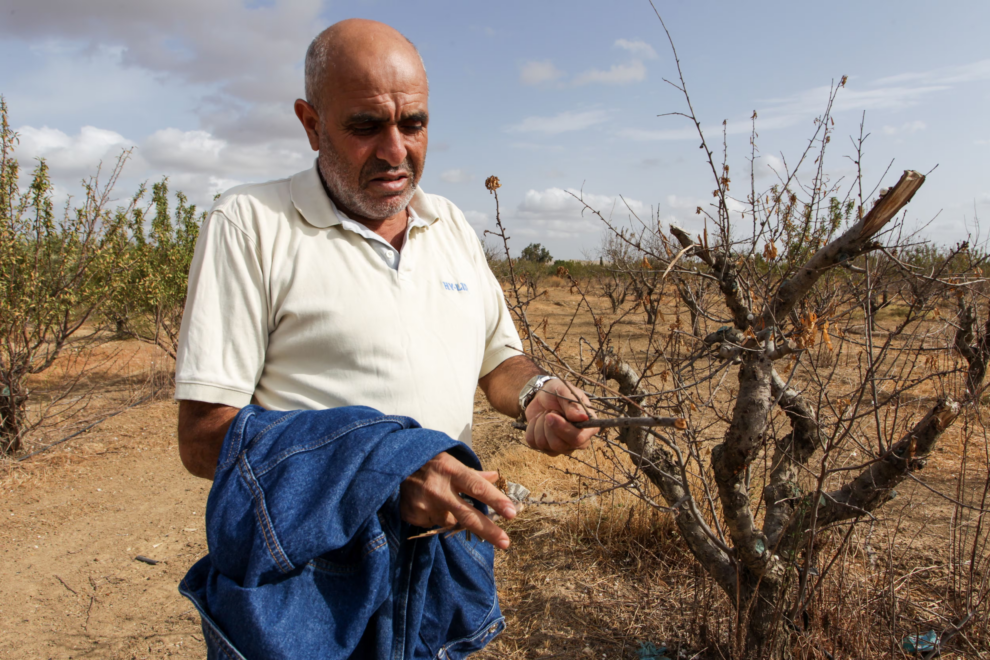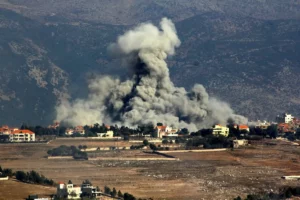
Almost six months have passed since Tunisia last had more than 500mm of rainfall, and those few drops could not save the harvests of countless farmers across the country.
Rising temperatures, longer summers and the absence of rain are increasing pressure on already depleted groundwater sources and widening what experts call “the map of thirst” for the population of the North African nation.
As the country experiences its sixth consecutive year of drought, with most dams and reservoirs almost empty, farmers feel helpless as lands they have inherited dry up, plants die and animals barely survive on the dwindling food.
About 100km away from the capital Tunis, between the Medjerda river and the Mediterranean, and against the foothills of the Khemir mountains, is the governorate of Beja, considered one of the country’s major agricultural hubs.
It provides Tunisia with much of its grain needs and also houses its largest dam.
The Sidi Salem Dam, near the city of Testour, in Beja, covers 4,300 hectares and has a maximum capacity of 643 million cubic metres of water. Constructed in 1982, it supplies much of the country’s drinking and irrigation water.
But now the dam sits at less than 30 per cent capacity, while the total rate of all Tunisian dams is as low as 22.5 per cent, according to the Tunisian Ministry of Agriculture.
A decade ago, the sight of picturesque golden wheat and barley crops thriving across the mountainous lands brought joy to those driving from the capital.
But that has been replaced by the heartbreaking view of barren land, reminding Tunisians that hunger and thirst is looming.
Farmers’ outcry
In the town of Mjez El Beb, The National met six farmers who shared the same wish – the arrival of rain clouds to signal an end to the long drought that has devastated their livelihoods.
Aymen Chaouachi, president of the farmers’ union in Beja, said that in November farmers usually have their seed beds ready, but not this year.
He said bureaucratic procedures and agricultural policies set up by the state sector are making farmers’ lives even harder.
They blame authorities for not listening to them and instead seeking alternative solutions to the continuing drought crisis.
Mr Chaouachi said the state’s agricultural policies, coupled with a shortage of seeds and their high price have left farmers in Beja unable to receive their quota. Meanwhile the black market is overflowing with seeds, including varieties that are better suited to the dry weather.
“We could change the seeds we use from a variety that needs 1,200mm of rainfall a month to ones that could survive with the less than the 200mm of rainfall that we now have,” he explained.
Ali Trabelsi, 63, a grain farmer for more than 50 years, told The National that at least 300 farmers growing barley and wheat would have no harvest this year.
He said not even access to drinking water is stable.
On March 31, the Ministry of Agriculture introduced a quota system for piped potable water, which meant authorities started cutting the supply to households every night.
Mr Trabelsi told The National that all they could do was pray for rain.
“This is the only livelihood we have,” he said. “We do not have salaries and some of us do not even own our land, it is mostly rented.”
Hopes die with the trees
Hatem Matousi, 58, has been cultivating olive trees, among other varieties, since the age of 15 on land once owned by his ancestors.
As his trees die, he is now faced with the harsh reality of having to sell the land to ensure his family’s survival.
Just a few olive trees are still standing but, he said, without enough rain the olives fell before they ripened.
“Even worms and insects that animals such as chickens eat can no longer be found in soil because of the lack of rain,” he said as he walked through rows of dead peach, quince and almond trees.
The economic impact of drought is mostly evident when the time for harvest comes.
Dozens of workers usually fill the olive groves in November to pick the fruit, spending a month working to support their families.
Mr Matousi said at least 25 families have been left without any income since his five hectares became barren.
Animals barely surviving
Soil on the mountains surrounding Mjez El Beb is dry, yellow and cracked.
Only few animals wander on vast fields, looking for fresh grass to eat, but finding much of it dead.
“We cannot do anything, this is something that is out of our hands but it’s the only job we have so, we keep going, hoping for God to have mercy on us,” shepherd Walid Bouzidi told The National as his herd of sheep searched for food in the dry earth.
The mountain’s water source, Ain Asem, used to flow down the hills for kilometres, irrigating green and fertile lands.
But it has dried up, as have the vast hills surrounding it.
Mr Bouzidi, a father-of-three, said he was tired of fighting to keep his herd alive, as feed becomes more expensive.
“You keep fighting and fighting but over what?” he said. “The day will come when you just give up.”
Source : The National News

















Add Comment